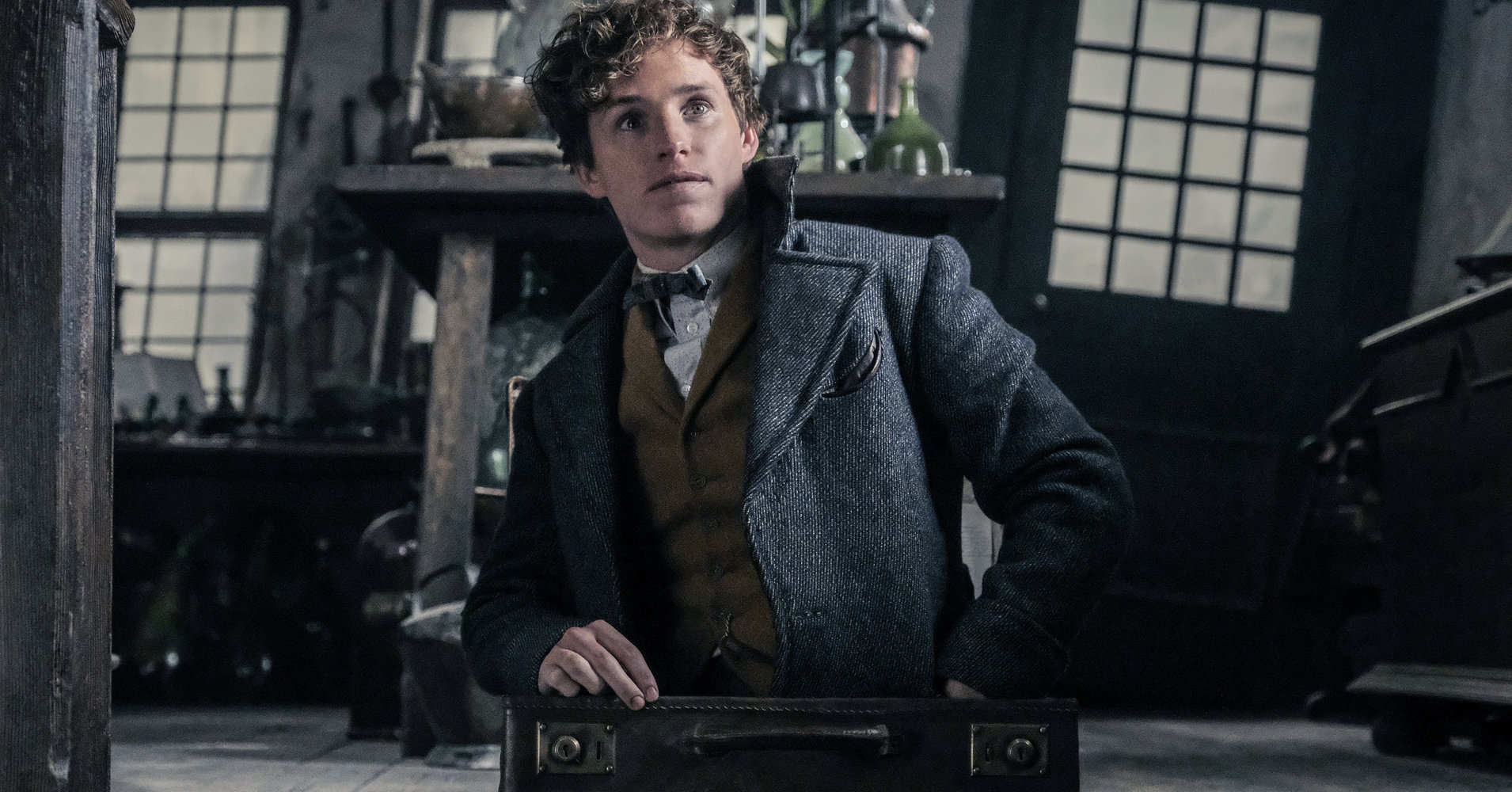[ad_1]

Note: Our books and culture critic, Claire Fallon, refuses to watch any of the “Fantastic Beasts” movies. Why? Just read her essay from 2016 on the clunky, unnecessary expansion of J.K. Rowling’s “Harry Potter” universe.
American Harry Potter fans found out, earlier this year, that their whole magical lives had been lived in deliberate ignorance: Muggle or not, we would never have gotten that coveted owl from Hogwarts. That’s because North America’s wizarding school, it turns out, is some place called Ilvermorny (according to J.K. Rowling).
OK, fine. Within the books themselves we’d learned about chic Beauxbatons, the French wizarding academy, and Durmstrang, which appears to educate students from the chillier regions of magical Europe. There are no American students at Hogwarts (though fan fiction is littered with violet-eyed, raven-haired American exchange students named “Esmeralda” and “Chloe” who take the British school by storm). Obviously, there would be an American school.
The Ilvermorny announcement turned out to be just the tip of the skeletal ship rising out of the Great Lake. With the film adaptation of Rowling’s Fantastic Beasts and Where to Find Them coming to theaters this fall, starring Eddie Redmayne as Newt Scamander, Rowling is preparing fans with a four-part series on America’s magical history, which will be available on Pottermore. The series will address Ilvermorny, the Salem witch trials, America’s magical governing body, and the Navajo legend of skinwalkers.
It seems sour to not just get excited when Rowling bestows upon us more Potter world tales, especially when lacking a valid complaint. (The series has already drawn criticism for apparently irresponsibly mystifying Native American people and their sacred customs — a very worthwhile debate.)
There’s something fundamental about the whole project of opening the franchise up to international histories and adventures, though, that irks me. Fundamental, but utterly trivial, of course. The essential flaw in the whole American magic installment is that it totally undermines the specific genre appeal of Harry Potter as opposed to other fantasy franchises.
The Harry Potter series, many have pointed out by now, basically combines magical fantasy with the classic boarding school novel — a staple of British, young adult literature. These books focus on children and adolescents’ experiences in a school environment, where their classmates and teachers replace their family unit as the structure of their days. They can be fairy-tale-like (The Little Princess) or funny and lighthearted (Daddy-Long-Legs, Malory Towers) or dark coming-of-age sagas (A Separate Peace).
The boarding school novel offers a deeply comforting and tiny world that allows young characters to act out, fail, succeed, and learn Life Lessons™. For one thing, it effectively gets rid of the protagonists’ restrictive parental relationships without throwing them, orphaned and vulnerable, upon the world. Mostly benevolent teachers and headmasters guard them from the big bad world, but within the warm cocoon of the school, the kids can run amok with their friends on a perpetual adolescent sleepover. Boundary-pushing is inevitable, with consequences muted by the bubble in which their transgressions occur. The worst thing that can happen to you at a boarding school, typically, is that you’ll have to leave it and return to the real world, for one reason (expulsion) or another (graduation).
Other fantastical series have married the wide-ranging thrills of magical worlds with the comfortable limits of boarding school settings. Not too long before Harry Potter, there was Wizard’s Hall, a novel by Jane Yolen about a hapless wizard student named Thornmallow, and Worst Witch, a series by Jill Murphy about a hapless witch student named Mildred Hubble. Tamora Pierce’s Circle of Magic books follow four differently gifted children as they learn about their supernatural talents in a supportive academic community, guided by wise mentors. And so on.
Contrast that to questing fantasy series like The Lord of the Rings trilogy or even the Percy Jackson series, where the landscape is ever-shifting and the stakes often difficult to grasp. It’s not that J.K. Rowling didn’t build a world, as J.R.R. Tolkien did; it’s that the center of the world was more fixed and constant, and the further from that center — Hogwarts — the more misty and indistinct the world needed to be.
Much of the delight of reading Tolkien lies in taking an imaginative journey with the characters through Middle Earth, traveling over vast new territories, stumbling across unexpected societies and creatures, and being essentially open to the elements. At any moment, Frodo and his band could meet a clan of Ents or be set upon by orcs. It’s never quite clear what terrain they’re on and what the risks or rewards might be. It’s a narrative arc familiar to anyone who’s read Homer: In the perilous quest for a distant goal, what strange or frightening events might happen?
Harry Potter could almost be seen as a flipped quest narrative. For most of the series, our protagonists are in conflict with villains who are seeking powerful objects — including Harry himself — for their own nefarious ends. Harry and his comrades want to thwart Voldemort from finding the Sorcerer’s Stone, not necessarily discover it themselves, though they ultimately may be driven to the point of trying to find it first. The Hogwarts status quo has its flaws (see: house elf liberation, Purebloods pitting themselves against Muggle-borns) but at a basic level, our main characters want to stay inside its walls and preserve its way of life, not go out seeking something that might change everything.
Besides, Hogwarts may not always be perfectly safe, but it’s closer than most places. It’s guarded with charms to prevent unlawful entry and other serious misbehavior. Inside, the ghosts never put a toe over the line of “mischievous,” and the house elves ensure the banquet tables in the Great Hall groan with an abundance of delicious food. The students have common rooms to retreat to for work and play, populated only by other members of their House and cozy canopied beds. Conflict plays out in rousing games of Quidditch and classroom banter. Even the classes sound delightful.
Readers spend most of their time with friendly Gryffindors, like Harry and his friends, who go relatively unsupervised by their Head of House, Professor McGonagall. It’s other, more rule-abiding students — prefects, officially — who do what little regulation must be done within their clubhouse. And of course, there’s the headmaster, Professor Dumbledore, of whom even Voldemort is afraid.
The Harry Potter books aren’t just a fantasy saga, but a series in which readers became more and more deeply enmeshed in a fictional home. Boarding school novels can’t just hang out indulging in pranks forever, obviously; often the central conflict of these books, especially as a series progresses, revolves around the protagonists finding that the school is no longer able to protect them from the realities of a harsh world. Hopefully, they’re able to call upon the lessons they’ve learned as students to rise to these new challenges, even strike out into the world on their own.
As the Harry Potter series continued, Harry, Ron and Hermione often found themselves temporarily thrown into increasingly terrifying, high-stakes situations, far beyond the controlled tests offered in their classes. Finally, even the school itself becomes compromised; it’s no longer a safe haven, and the three friends choose to leave before their last year for the still more risky journey throughout the magical world to defeat Voldemort.
Deathly Hallows takes the form of a quest, unlike the six previous books in the series, but Hogwarts remains the beating heart. Even as the friends travel across rather nondescript lands in search of the remaining Horcruxes, the journey is leading them, inevitably, not to an unseen destination, but back to Hogwarts for the final, climactic battle. As the series ends, Harry, Ginny, Ron and Hermione have returned to Platform 9 3/4 to send their own children off to Hogwarts, a quiet narrative reassurance that our fictional home base has recovered and that the magical school adventures will go on, even as the books are ending.
Rowling has drawn adoration and criticism for continuing to write about the Potterverse after the series ended; officially, she’d said she planned to end the series at seven, a position she still maintains. But unofficially the franchise keeps expanding story by story and snippet by snippet. In a new play Rowling collaborated on, Harry Potter and the Cursed Child, audiences will see a middle-aged Harry struggling with his career and his son’s early difficulties, which seems like a bit of a run around to the ending of the books.
Now that we’re dabbling in bits of non-Hogwarts magical history — stories from other continents entirely, in fact — the degree of building out of the magical world almost seems to be undermining the perfectly contained world Rowling built within Britain and its beloved wizarding school. The Potter world felt and continues to feel to me like my own bedroom: It isn’t insulated from the threats of a dangerous world, but its particularity and familiarity make me feel psychologically cushioned enough to face those threats.
If my bedroom suddenly became the size of a football field, it would change the whole nature of my room and my relationship with it. Now the Potterverse’s walls seem to be coming down, and instead of feeling excited, I just want to hold onto that room that was just the right size.
Obviously, I can ignore this. I can and probably will, because this isn’t what Harry Potter’s joy meant to me. Reading about Rowling’s conception of American wizarding history sounds about as necessary as reading a history of German courting customs by Jane Austen ― completely divorced of the specificity, detail and circumscription that made the originals so invitingly tiny and yet enormously complete.
And if you’re excited to read and talk about and argue on the “History of Magic in America,” far be it from me to begrudge you that. You can get started on that on Pottermore today ― enjoy.
“Fantastic Beasts: The Crimes of Grindelwald” hit theaters in November 2018.
[ad_2]
Source link

